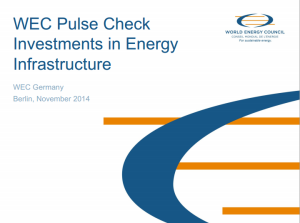WEC Germany’s “pulse check” of energy experts from 36 WEC member countries have found that for European power infrastructure, only a quarter of experts see a positive investment climate while for gas infrastructure only a third see a positive outlook. While outside Europe, however, two thirds of respondents see a positive investment outlook for power and gas.
In addition, almost half of the European respondents did not see a change in the investment mood compared to last year (2013), and less than 20% saw an improvement. However, in the rest of the world, 60% of experts believe the investment mood has improved since last year.
This is all the more worrying as two-thirds of all respondents view investments in energy infrastructure as a major necessity for the future.
The power sector attracts by far the most investment in Europe. Moreover, the energy sector remains heavily regulated, despite the start of liberalisation in 1998. In the 2014 survey national energy regulation has been deemed by two thirds of European respondents as the most important factor influencing the mood of energy investment.
WEC Germany seeks to use the survey results to contribute to the debate about the future regulatory framework for energy.
The results, which echo the findings of the Council’s recently released 2014 World Energy Trilemma report, also show how vital a reliable political framework is for increasing private investment in energy.

-
The survey is summarised in a presentation downloadable from the WEC Germany webpage.
-
The 36 countries which responded to the survey are: South Africa, Hong Kong, India, Japan, Kazakhstan, New Zealand, the Philippines, South Korea, Austria, Croatia, Czech Republic, Denmark, Estonia, Finland, France, Germany, Greece, Italy, Lithuania, the Netherlands, Poland, Romania, Serbia, Slovakia, Slovenia, Spain, Sweden, Switzerland, Turkey, Argentina, Colombia, Dominican Republic, Ecuador, Lebanon, Tunisia, USA





